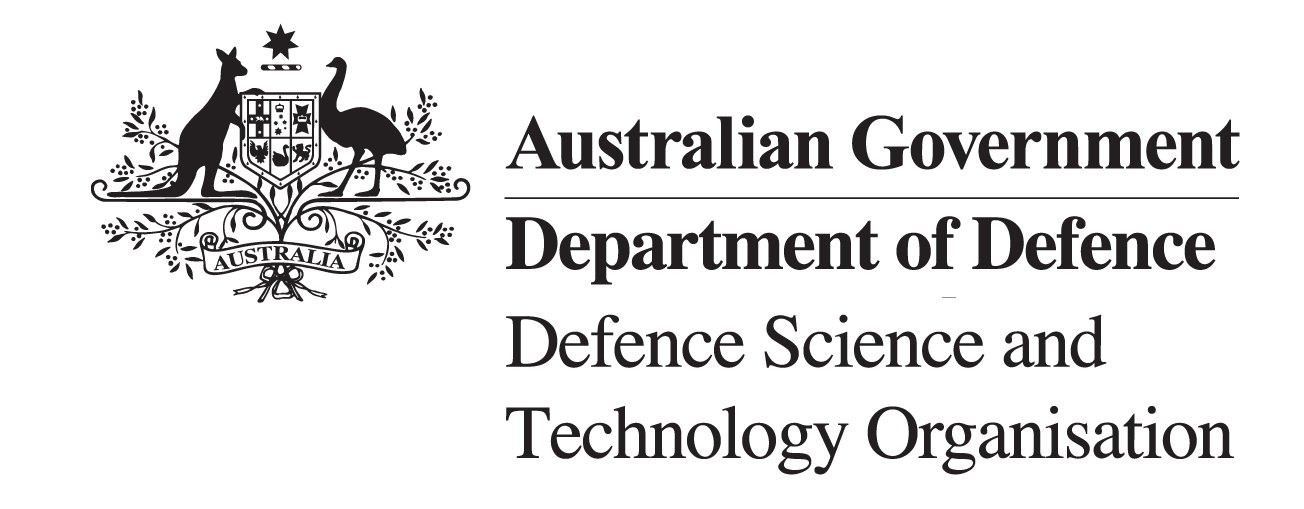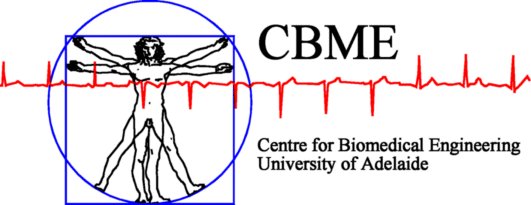Conference Program
Posters are to be mounted at 8am so they can be viewed over the 2-days during all four coffee breaks.
8:00am—9:00am
Registration Please arrive early for quick processing and so we can start on time.
9:00 am—9:50 am
The Opening Ceremony—(Starts 9am sharp).
Master of Ceremonies: Dr. Sam Mickan.
9:00am Dr. Mickan briefly introduces the Dean of Engineering, Prof. Peter Dowd, (1min).
The Welcome: Prof. Peter Dowd introduces Prof. Neville Marsh, Deputy Vice Chancellor (Research) of the University of Adelaide, (2mins).
Prof. Neville Marsh introduces the Hon. Trish White MLC, (3mins).
Opening Address: Hon. Trish White MLC, (10mins).
9:16am Dr. Mickan briefly introduces Prof. Shane Cloude, the DSTO Chair in Microwave Radar, (1min).
Prof. Cloude introduces Dr. D. "Nanda" Nandagopal, Director of the Systems Sciences Laboratory in the Defence Science and Technology Organisation (DSTO), (2 mins).
Sponsor's address: Dr. D. "Nanda" Nandagopal. (10mins).
9:29am Dr. Mickan briefly introduces Prof. Derek Abbott. (1min).
The Prologue Address: Prof. Derek Abbott gives a brief layman's introduction T-rays and the vision for the workshop, (20 mins).
The Declaration: Dr. D. "Nanda" Nandagopal officially declares the workshop open, (1min).
9:50am—10:30am
Session 1—Keynote
Address
(Chair: Prof. Derek Abbott, University of Adelaide)
Prof. Xi-Cheng Zhang, "Terahertz
wave spectroscopy and imaging for defence applications," Center for
Terahertz Research, Rensselaer Polytechnic Institute, New York, USA.
(35mins + 5mins questions)
10:30am—11:00am
Morning coffee break (30mins)
VIPs and guests invited specifically for the opening ceremony are invited to stay until end of coffee.
11:00—12:30am
Session 2—TeraHertz
in Defence
(Chair: Prof. Shane Cloude, University of Adelaide)
Dr. James O. Jensen, US Army, Maryland, USA, "U.S. Army research in terahertz sensing science & electronic technology: current progress and future directions for effective battlefield deployment. (25mins + 5mins questions)
Dr. Roger Appleby, QinetiQ, Malvern, UK, "From THz to passive millimetre waves for security applications." (25mins + 5mins questions)
Dr. Bernd M. Fischer, University of
Freiburg, Germany, "Chemical recognition with broadband THz spectroscopy
and its applications in the defence and security sectors."
(25mins + 5mins questions)
12:30pm—1:30 pm
Lunch—An Aussie luncheon barbeque will be served in The University of Adelaide Staff Club.
1:30pm—2:30 pm
Session 3—TeraHertz in Security and Related Applications—I (Chair: Dr. Angus Massie, DSTO)
Dr. Tamath Rainsford, The University of Adelaide, Australia, "Terahertz sensing and imaging—global review of applications." (25mins + 5mins questions)
Dr. Ruth Woodward, Picometrix, USA, "Terahertz instrumentation for security and non-destructive evaluation." (25mins + 5mins questions)
2:30pm—3:30 pm
Session 4—TeraHertz in Security and Related Applications—II (Chair: Dr. Bevan Bates, DSTO)
Dr. Tony Fitzgerald, TeraView Ltd., Cambridge, UK, "Terahertz reflection spectroscopy in security and biological applications." (25mins + 5mins questions)
Dr. Bradley Ferguson, Tenix Defence Pty Ltd, Australia, "Towards the realisation of three-dimensional THz inspection systems." (25mins + 5mins questions)
3:30pm—4:00pm
Afternoon coffee break (30mins) Opportunity to view posters and student RF projects.
4:00pm—4:30pm
Session 5—Panel Discussion—From Bluetooth to Bluefang: Is THz feasible for short-link secure wireless communications? (Chair: Dr. Bruce Vyden, DSTO)
Panelists:
- Prof. Neil H.E. Weste (The University of Adelaide and NHEW P/L),
- Prof. Reg Coutts (The University of Adelaide and Coutts Communications P/L),
- Dr. James O. Jensen, (US Army, Maryland, USA),
- Prof. Bob Miles (University of Leeds, UK),
- Prof. Dan van der Weide (University of Wisconsin-Madison, USA).
Questions: What are the disadvantages and advantages of THz comms over RF or IR? Why not use IR instead of THz? Power and link budget? Receiver sensitivities? Source powers? Propagation characteristics? System issues? Cost issues? Indoors versus outdoors? Interference and band allocation issues for RF? Solar background and noise issues for IR? Does THz have a plausible niche? Who needs Bluefang anyway? (30mins).
4:30pm-4:45pm
Special Session on AOARD Funding Opportunities—Major Tony Mitchell, Asian Office of Aerospace Research and Development (AOARD). (Chair: Dr. Tamath Rainsford). (15mins)
7:00 pm—10:30 pm
A tour of the historic Adelaide Goal. Cold and hot canapes will be served during the tour. Followed by the banquet.
- Starter: (i) Sweet potato and coconut soup with coriander (cilanthro) pesto, or (ii) Roast capsicum (pepper), spinach and ricotta roulade.
- Main Course: (i) Grilled territory barramundi (an Australian fish delicacy) with pistachio crust & lemon lime sauce, or (ii) Chargrilled fillet of beef with chilli onion confit & field mushroom sauce.
- Dessert: (i) Profiteroles, or (ii) Belgian chocolate and raspberry torte served with pure cream and chocolate shards.
- White wine: Wirra Wirra Unwooded Chardonnay
- Red wine: Annie's Lane Cabernet Merlot
- Beer: VB
Friday 17 December
Day 2
9:00am - 10:30am
Session 6—Bio and Chemical Sensing
with T-rays
(Chair: Dr. Jacinta White, CSIRO)
Prof. Kodo Kawase, RIKEN and Tohuku
University, Japan, "Detection of drugs in mail using THz-waves."
(25mins + 5mins questions)
Prof. Andrea Markelz, University at Buffalo, New York, USA, "Establishing THz sensitivity of target to probe binding for pathogen detection." (25mins + 5mins questions)
Dr. Samuel P. Mickan, The University of Adelaide, Australia, "T-ray biosensing." (25mins + 5mins questions)
10:30am—11:00am
Morning coffee break (30mins) Opportunity to view posters and student RF projects.
11:00am- 12:00noon
Session 7—T-ray Techniques (Dr. Warren Marwood, DSTO).
Dr. Torsten Löffler, Johann Wolfgang Goethe-Universität Frankfurt am Main, Germany, "Opto-electronic techniques for remote-sensing and imaging with pulsed and continuous wave THz radiation." (25mins + 5mins questions)
Prof. Daniel van der Weide, University of Wisconsin, USA, "Antennas and electronics for sub-THz stand-off spectroscopic imaging." (25mins + 5mins questions)
12:00noon—1:00pm
Lunch—A baguette and foccacia luncheon will be served in The Rumours Cafe, Level 6, Union Building.
1:00pm—2:00pm
Session 8—Material
characterisation with T-rays
(Chair: Dr. Brad Ferguson, Tenix Defence Systems).
Prof. Robert E. Miles, University of Leeds, UK, "Terahertz science and technology for material identification and classification." (25mins + 5mins questions)
Prof. Roger A. Lewis, University of Wollongong, Australia, "Terahertz technology and material properties." (25mins + 5mins questions)
2:00pm-3:00pm
Session 9—High power
electron beam T-ray sources
(Chair: Prof. Jesper Munch, University of Adelaide).
Dr. Sandra G. Biedron, Argonne National
Laboratory, Illinois, USA, "The use of terahertz radiation for global
homeland security: focus on compact electron beam based sources."
(25mins + 5mins questions)
Dr. Anthony W. Thomas, Jefferson Lab.,
USA, "High power THz generation for concealed weapon detection and
battlefield communications—power and portability issues."
(25mins + 5mins questions)
3:00pm-3:30pm
Afternoon coffee break (30mins) Opportunity to view posters and student RF projects.
3:30pm-4:00pm
Session 10—Australian
National T-ray facility
(Chair: Prof. Neil H.E. Weste, University of Adelaide & NHEW P/L).
Dr. Samuel P. Mickan, The University of Adelaide, Australia, "A national user-facility for advanced T-ray imaging and spectroscopy." (25mins + 5mins questions).
Panel Discussion 2—How to spend $2.5 million? Vision for an Australian multiuser T-ray facility.
Panelists:
- Prof. Xi-Cheng Zhang, RPI, USA — A global perspective
- Dr. Ruth Woodward, HT Consultants/Picometrix, USA — A global perspective
- Dr. Roger Appleby, QinetiQ, UK — A defence perspective
- Dr. Trevor Bird, CSIRO — A national perspective
- Prof. Don Sinnott, The University of Adelaide — A South Australian perspective
- Dr. Warren Marwood, DSTO — A DSTO perspective
- Prof. Derek Abbott, University of Adelaide — A university perspective.
Questions: National priorities? Global benefit? Global science trends? Enhancement for mankind? Defence priorties? Hot science? Trade-offs? Risks? Threats? Opportunities? (30mins).
4:00 pm—5:00pm
Oral Session 11—Bridging from submillimeter
to millimeter waves—Part I.
(Chair: Dr. Kieran Greene, CSIRO)
Dr. Trevor Bird, CSIRO ICT Centre, Australia,"Terahertz
imaging from a RF engineering perspective."
(25mins + 5mins
questions).
Dr. Roger Appleby, QinetiQ, Malvern, UK, "Mechanically
scanned real time passive millimetre wave imaging at 94 GHz."
(25mins
+ 5mins questions).
5:00 pm—6:00pm
Oral Session 12—Bridging
from submillimeter to millimeter waves—Part II.
(Chair: Dr. Mark Pszczel, DSTO)
Dr. Hedley J. Hansen, Defence Science and Technology Organisation (DSTO), Australia, "Stand-off detection using mm-wave spectroscopy." (25mins + 5mins questions).
Leonard T. Hall, The University of Adelaide, Australia, "Simple and effective design techniques for passive mm-wave devices." (25mins + 5mins questions).
6:00pm, Close.
- DSTO announces winner of $2,500 student competition.
- Close, followed by informal drinks at The Adelaide University Staff Club (go Dutch).

.gif)
